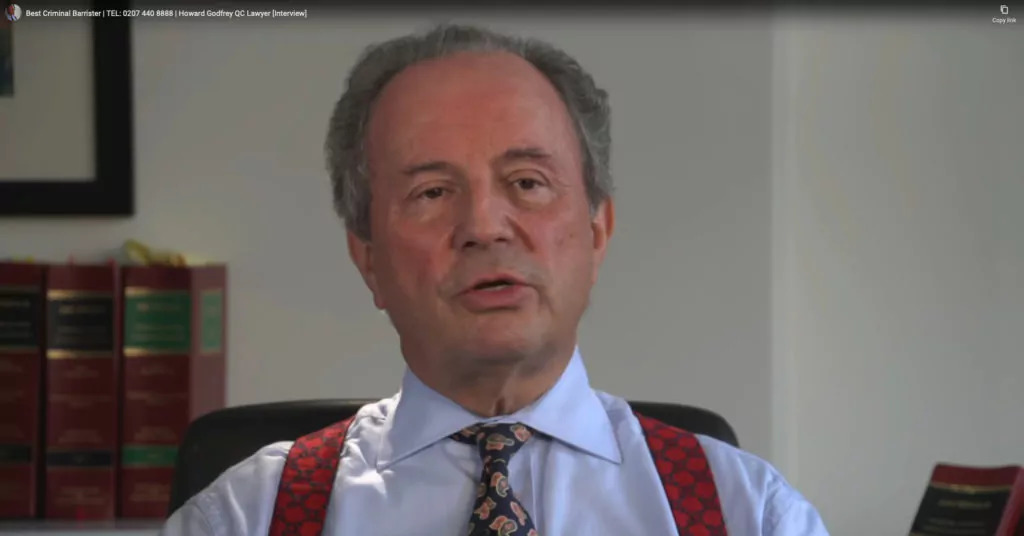One of the UK’s Best Criminal Fraud Defence Barrister KCs [QCs]
As one of the best fraud defence barristers in the UK, Howard Godfrey KC [QC] has an extraordinary range and depth of experience which has led to his enviable case track record of success in this area of law – both at trial and at appeal hearings.
There are a wide range of fraud charges, many of which are tax frauds where the defendants are directors or employees of companies.
Top-Rated Specialist Fraud KC [QC] | London, UK, International
Expert in Successfully Defending Criminal Fraud charges
Tax Fraud Charges, including:
- Cheating the Revenue
- VAT frauds, including carousel and missing trader fraud (MTIC)
- Construction industry scheme fraud (CIS)
- Stamp Duty evasion fraud
- Tax saving scheme frauds
Other Criminal Fraud Charges, Including:
- Conspiracies to defraud
- False accounting
- Insider dealing
- Insolvency/liquidation frauds
- Trading whilst insolvent
- Boiler room (worthless share) frauds
- Building and maintenance contract frauds
- Mortgage frauds
- Forgery
- Others
Over the years, HMRC has become a very efficient and enthusiastic prosecution force. Many tax avoidance schemes that would have only ever been challenged in the civil courts are now regarded as criminal tax evasion and prosecuted as such.
Honest business people and professional advisors can, without realising, become involved in such schemes. Honest traders can also become implicated in massive VAT frauds, devised and controlled by people they’ve never even met.
Other types of fraud case are prosecuted by specialist departments such as the Serious Fraud Office and the Crown Prosecution Service. As with tax fraud, the defence has to be prepared with great care. The job of the defence KC [QC] is to ‘see the wood for the trees’ and identify the critically important elements for the client.
Very often in fraud cases many of the facts are not denied. What is in dispute in these cases is the client’s knowledge of the fraud and his state of mind at the material time. These cases all require the prosecution to prove that the defendant acted dishonestly and it is this issue that is most often crucial to the defence case.
Early advice as to the best tactics when there is an investigation underway is critical, and Howard Godfrey’s advice is often sought at this stage, long before any final decision to prosecute is taken.
Some Sample Fraud case Wins:
Conspiracy to Defraud – Acquittal[K & OTHERS]
K was the main defendant in the case, and was the CEO of a housing charity. He and the directors of a building company were tried for conspiracy to defraud the charity in relation to house building and maintenance contracts. The two co-defendants gave evidence. K did not. He was acquitted by the jury at the end of a long trial.
Conspiracy to Cheat HMRC – Acquittal[A & OTHERS]
This was the biggest excise duty fraud case. A was a dealer in imported wines and spirits. He was charged with conspiracy to cheat HMRC. Lengthy pre-trial arguments took place relating to disclosure by the prosecution of European trading records. The judge ruled in favour of the defence that the prosecution must provide the disclosure. The prosecution were unable (or unwilling) to comply with the judge’s order, and the judge stayed the proceedings as an abuse of the process of the court. The client had a verdict of not guilty recorded and was discharged.
Accountancy Tax Fraud – Acquittal[K & OTHERS]
K was an accountant and company director alleged to have been involved in a dishonest tax saving scheme. The case involved the flotation of companies and the fraudulent ‘ramping’ up of the share price to unrealistic levels. The shares were then gifted to charities at an inflated value, resulting in a major tax deduction by clients of the firm, and a large tax loss to HMRC. K did not give evidence. He was the only one of the accountant defendants to be acquitted by the jury.
Multi Million Pound Stamp Duty Fraud – Suspended Sentence[ G ]
G had been the senior partner in a large firm of solicitors. He was prosecuted for a multi million pound fraud in relation to a dishonest schemes to avoid stamp duty being paid by property buyers. Pressure for disclosure of information resulted in HMRC eventually conceding that the lost tax had in fact been repaid! In the light of that new concession, the judge was asked if he would pass a non-custodial sentence if the client pleaded guilty to certain specimen charges. The judge agreed. The client received a suspended sentence.

